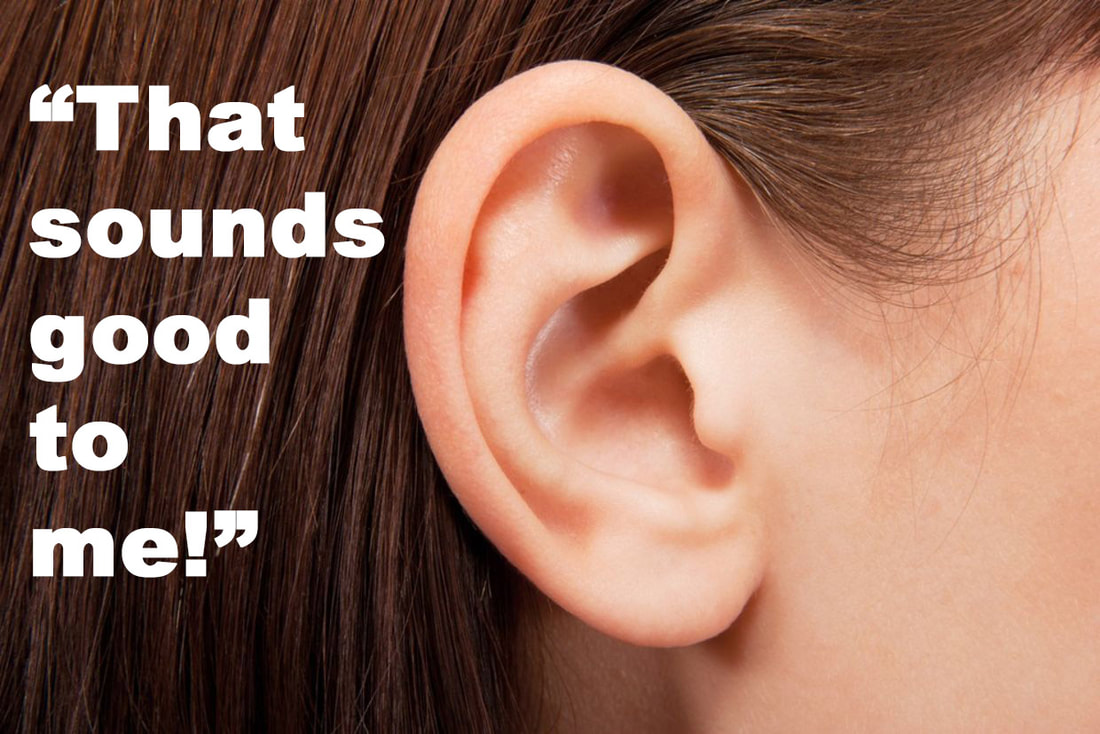“That sounds good to me!”
We've heard that phrase hundreds of times in our life. Here are a few thoughts on how it applies to our work as music educators. And believe me, it applies.
One at a Time
It’s hard to talk and listen at the same time. Best advice: the teacher needs to talk less and listen more. Make sure you repeatedly remind your students that’s what you’re trying to do. Modeling pays off.
Lesson Plans
When you write out lesson plans, don’t aim to be wordy or lengthy. Just nail the phrases, concepts, ideas, goals, and arks to your learning and teaching. And don’t forget exit strategies and assessments.
After you've got it this information down on your cocktail napkin (because maybe you are like me and did it sitting at a bar), read it out loud. The bartender might think you’re nuts but it will pay off in the long run.
Does it ring true? Did you leave something out that is more crucial than something you wrote? If so, maybe cross out the weaker idea and include the newly recognized tidbit.
Your ears won't lie. They'll tell you what's missing.
Learning a Piece of Music
We can all be analytical when looking at a piece of music.
It's easy to figure out the tessitura of a piece, relate it to our own vocal range, and determine the best key to put the song in.
The next step is crucial.
Sing the song from beginning to end, keeping mental notes of potholes in your performance. After you're done, reassess the key and take note of the issues you had in certain spots and how you're going to correct.
On more than several occasions, I've heard people attempt to do a song that they had practiced in their head but not in their mouth or their hands. The resulting performance was less than optimal.
Teach listening. Find opportunities when half your class performs and the other half critically listens.
Do it out loud. Listen to your ears. They won't lie to you.
Your Temperament When Dealing With Discipline Or Management Issues.
This is one of those self-assessment pieces that begs for you to have a recording of your work. Not necessarily a video but at least an MP3.
Your words can have profound impact on your students, especially when things suddenly go sideways with discipline or classroom management.
Many teachers talk about that “one class”, the one that always seems to be problematic.
It’s wise to get in the habit of recording those classes to discover what approaches and words work and which ones exacerbate problems.
Analyze and assess your recordings, evaluating your comments and attitude as if they were elements in a piece of music.
Was the tempo to fast? Was it too loud? Did your statements have too much or too little honest emotional content? Did your phrasing lead to resolutions that felt natural?
Would your approach be characterized as win/win or would an impartial observer view them as aggressive emotional venting?
Most of all, if you had the chance to do it all over again, how would you edit your work and make it stronger in the moment?
I can't lay claim to this idea. My dad taught it to me when I was in my single digits.
By fourth or fifth grade, every Sunday afternoon, anything that I had to write for school, my father required me to read it out loud in front of him. Every time I started to read, I would catch myself saying something that sounded awkward and incorrect.
I would look at him and he would just raise an eyebrow and tilt his head to the side.
After a while, I figured out that it would be a better strategy to read it out loud to myself before I got to him to avoid all the raised eyebrows.
Amazingly, things went better for me during my recitations.
When I got my first full-time teaching gig after college and had to prepare remarks for concerts, I asked my father for advice. It was pretty succinct.
“Write it down. Read it out loud. Your ears won't lie to you.”
I took his advice.
I wrote all my concert remarks out and I practiced them until I memorized them.
I got to the point where I would write in little mistakes that I could turn into jokes. That worked well with the parent audiences who were already nervous about their child’s upcoming performance. If the first mistake is made by the teacher and he can laugh it off, that bodes well for any potential mistake a kid might make.
My dad was right. Eventually, I didn't have to write my remarks out. I had done it so many times and had enough data in my brain from past experience that I could improvise just like a jazz player riffs on a set of chord changes.
I hope some of these ideas help.
There are many ways to get to “that sounds good to me”.
Find your own path. Borrow techniques, tips, and tricks from the people you observe that seem to have the gift of gab while facing an audience.
Chances are, the gift they possess is a habit of preparation and editing their remarks before they step in front of an crowd or a microphone.
We've heard that phrase hundreds of times in our life. Here are a few thoughts on how it applies to our work as music educators. And believe me, it applies.
One at a Time
It’s hard to talk and listen at the same time. Best advice: the teacher needs to talk less and listen more. Make sure you repeatedly remind your students that’s what you’re trying to do. Modeling pays off.
Lesson Plans
When you write out lesson plans, don’t aim to be wordy or lengthy. Just nail the phrases, concepts, ideas, goals, and arks to your learning and teaching. And don’t forget exit strategies and assessments.
After you've got it this information down on your cocktail napkin (because maybe you are like me and did it sitting at a bar), read it out loud. The bartender might think you’re nuts but it will pay off in the long run.
Does it ring true? Did you leave something out that is more crucial than something you wrote? If so, maybe cross out the weaker idea and include the newly recognized tidbit.
Your ears won't lie. They'll tell you what's missing.
Learning a Piece of Music
We can all be analytical when looking at a piece of music.
It's easy to figure out the tessitura of a piece, relate it to our own vocal range, and determine the best key to put the song in.
The next step is crucial.
Sing the song from beginning to end, keeping mental notes of potholes in your performance. After you're done, reassess the key and take note of the issues you had in certain spots and how you're going to correct.
On more than several occasions, I've heard people attempt to do a song that they had practiced in their head but not in their mouth or their hands. The resulting performance was less than optimal.
Teach listening. Find opportunities when half your class performs and the other half critically listens.
Do it out loud. Listen to your ears. They won't lie to you.
Your Temperament When Dealing With Discipline Or Management Issues.
This is one of those self-assessment pieces that begs for you to have a recording of your work. Not necessarily a video but at least an MP3.
Your words can have profound impact on your students, especially when things suddenly go sideways with discipline or classroom management.
Many teachers talk about that “one class”, the one that always seems to be problematic.
It’s wise to get in the habit of recording those classes to discover what approaches and words work and which ones exacerbate problems.
Analyze and assess your recordings, evaluating your comments and attitude as if they were elements in a piece of music.
Was the tempo to fast? Was it too loud? Did your statements have too much or too little honest emotional content? Did your phrasing lead to resolutions that felt natural?
Would your approach be characterized as win/win or would an impartial observer view them as aggressive emotional venting?
Most of all, if you had the chance to do it all over again, how would you edit your work and make it stronger in the moment?
I can't lay claim to this idea. My dad taught it to me when I was in my single digits.
By fourth or fifth grade, every Sunday afternoon, anything that I had to write for school, my father required me to read it out loud in front of him. Every time I started to read, I would catch myself saying something that sounded awkward and incorrect.
I would look at him and he would just raise an eyebrow and tilt his head to the side.
After a while, I figured out that it would be a better strategy to read it out loud to myself before I got to him to avoid all the raised eyebrows.
Amazingly, things went better for me during my recitations.
When I got my first full-time teaching gig after college and had to prepare remarks for concerts, I asked my father for advice. It was pretty succinct.
“Write it down. Read it out loud. Your ears won't lie to you.”
I took his advice.
I wrote all my concert remarks out and I practiced them until I memorized them.
I got to the point where I would write in little mistakes that I could turn into jokes. That worked well with the parent audiences who were already nervous about their child’s upcoming performance. If the first mistake is made by the teacher and he can laugh it off, that bodes well for any potential mistake a kid might make.
My dad was right. Eventually, I didn't have to write my remarks out. I had done it so many times and had enough data in my brain from past experience that I could improvise just like a jazz player riffs on a set of chord changes.
I hope some of these ideas help.
There are many ways to get to “that sounds good to me”.
Find your own path. Borrow techniques, tips, and tricks from the people you observe that seem to have the gift of gab while facing an audience.
Chances are, the gift they possess is a habit of preparation and editing their remarks before they step in front of an crowd or a microphone.


 RSS Feed
RSS Feed